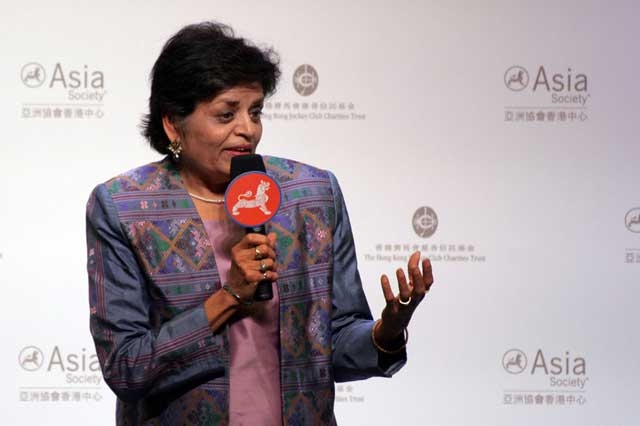Ending Benign Neglect: Addressing the Needs of Asian-Pacific American Employees

Originally published in The Huffington Post on March 1, 2012
It is almost a truism that the model minority paradigm is harmful to Asian-Pacific Americans (APAs).
The generic trappings of "success," from educational attainment and household income to purchasing power and market growth, hide not only real genuine disparities between different APA groups but are also often cited as reasons to overlook APAs in diversity discussions — a benign neglect of sorts. Research indicates that even in today's political arena, where a few hundred votes can tip an election, APAs are frequently overlooked.
Nowhere is this situation more evident than in the workplace. Generally, APAs are able to obtain employment and progress through the junior and mid-level ranks. Yet, there has been no appreciable increase in their presence at the most senior levels, including the C-suite or corporate boards. If APAs have actually solved the riddle of success in corporate America, how can this be true?
A 2011 study from researchers at the University of California, Riverside, shows that APAs are perceived as less ideal than Caucasian Americans when it comes to attaining leadership roles. Misperceptions of APAs arise as barriers to career advancement, once objective measures of performance stop; despite the fact that APA employees are equally as ambitious and skilled as their non-APA peers. For example, a recent Center for Talent Innovation Study reveals that 92 percent of APAs want high compensation while 59 percent are looking for a powerful position and prestigious title.
APA employees are keenly aware of this disparity. Asia Society's 2011 Asian Pacific Americans Corporate Survey indicates that APAs who have been in the U.S. the longest have the least favorable view of their companies. For example of APAs who were born in the U.S. or have lived here for 20+ years:
- only 49 percent view their growth and professional development opportunities favorably; and
- just 38 percent view their company's leadership vis-à-vis the APA market and employees favorably.
These are the same employees who are assumed to be the most integrated and "American."
This data paints an interesting and surprising diversity picture and dilemma that persists in the workplace, and one that both Corporate America and APA professionals who are interested in advancement need to confront head-on.
The stereotype of the quiet, compliant APA employee affects millions of people and ultimately results in tremendous losses, both in terms of contributions from APA employees and the company's bottom-line.
How does this occur on a day-to-day basis in companies today? Questions frequently arise about an APA's performance, especially regarding "assertiveness" or whether he or she has a "problem communicating." Also, issues regarding "chemistry with the team" too often place them at a disadvantage when hiring and promoting decisions are made.
Even when APA employees exhibit the leadership skills and behavior expected by others, APAs are viewed through a different lens. Some managers are not interested in the thoughts or opinions of an APA team member (Why is he challenging the client?). Or conversely, if an APA team member does not voice his thoughts or opinions it can often be interpreted as a lack of assertiveness (Why isn't he challenging the client?).
So how can companies and organizations, as well as APA employees themselves, move forward?
For APA employees, the focus needs to move beyond fundamental skills acquisition. Subconscious perceptions on the part of non-APA managers and colleagues mean that APAs must more openly and candidly seek out the advancement and development opportunities needed for progress to the next professional level. APA employees also need to assume a more active role in not only seeking out mentors but being mentors for other APAs.
Our research suggests three broad initial areas of focus for companies and organizations:
Create professional development programs focused on the majority of your APA employee population.
Staff development programs need to consider the needs and goals of the entire APA community, not only the newest community members. For example, assertiveness training is more relevant for newer arrivals to the U.S. Offering these types of programs to native-born APAs can be considered deeply offensive, while a mentorship program may be exactly what the APA employee needs.
Understand that simply having an APA employee resource group (ERG) is not enough.
APA employee resource groups must move beyond celebrations of Asian festivals and cocktail hours. A company booth at a Lunar New Year parade may show your support for the Asian Pacific American community. However, ERG members would likely benefit more from education and sponsorship programs, and activities that would raise their visibility, increase their skills and pave the way to more coveted assignments.
Re-examine, and if necessary re-work, your talent pipeline and management practices.
Take a candid look at your recruitment, promotion and staff assignment policies and procedures.
Clients rarely want a team whose members all look and think alike. Work with your entire team to create a melting pot of diverse talent and points of view that integrates varying skills, thoughts and ideas, and delivers the best possible service or product.
The decrease in APAs' workplace favorability and engagement levels can only be fully addressed and resolved through a concerted effort by APA employees and Corporate America. However, while my focus has been on the APA workplace experience, the core principles underlying my message — respect for all employees, recognition for individual contributions, and commitment to shared goals and values — are universal and apply equally to all employees and organizations.


